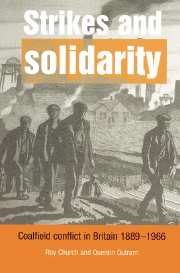Book contents
- Frontmatter
- Contents
- List of figures and tables
- Preface
- List of abbreviations
- 1 Interpreting coalfield conflict: focus and formulations
- 2 Tradition and modernity: the mining industry 1889–1940
- 3 Employers and workers: organizations and strategies
- 4 Employers and workers: ideologies, attitudes and political orientations
- 5 Configurations of strike activity
- 6 Strike participation and solidarity before 1912
- 7 Strikes, organization and consciousness in 1912 and after
- 8 Conflictual context? The ‘isolated mass’ revisited
- 9 Mining and modernity: size, sectionalism and solidarity
- 10 The foundations of strike propensity
- 11 Miners and management: agency and action
- 12 Industrial relations and strikes after nationalization
- 13 International perspectives
- 14 Myths and realities: strikes, solidarity and ‘militant miners’
- General appendix
- List of references
- Index
4 - Employers and workers: ideologies, attitudes and political orientations
Published online by Cambridge University Press: 04 December 2009
- Frontmatter
- Contents
- List of figures and tables
- Preface
- List of abbreviations
- 1 Interpreting coalfield conflict: focus and formulations
- 2 Tradition and modernity: the mining industry 1889–1940
- 3 Employers and workers: organizations and strategies
- 4 Employers and workers: ideologies, attitudes and political orientations
- 5 Configurations of strike activity
- 6 Strike participation and solidarity before 1912
- 7 Strikes, organization and consciousness in 1912 and after
- 8 Conflictual context? The ‘isolated mass’ revisited
- 9 Mining and modernity: size, sectionalism and solidarity
- 10 The foundations of strike propensity
- 11 Miners and management: agency and action
- 12 Industrial relations and strikes after nationalization
- 13 International perspectives
- 14 Myths and realities: strikes, solidarity and ‘militant miners’
- General appendix
- List of references
- Index
Summary
The industrial relations experienced by coalminers and coalowners reflected not only the structures and organizations of the industry but also the attitudes and ideologies which miners and owners brought with them to workplace, meeting room and conference chamber. These attitudes and ideologies were influenced by each miner's own experience in the industry but also and decisively by events and developments in the wider society: the decline of Liberalism and the rise of Labour; the First World War and the Russian Revolution; the Great Depression and the renewed threats of war in the later 1930s. This chapter considers the attitudes and ideologies of coalowners and miners, proceeding to a discussion of the extent to which these illuminate the industry's strike history before 1940: how important in explaining strike activity was the growth of leftist organizations and the role of activists?
As is so often remarked in the modern historiography of the industry there is a huge disparity between what is known of miners and what is known of mine owners. An abundance of material, particularly biographical, is readily available on miners' leaders which permits a detailed examination of their ideas, political affiliations, and activities. On the coalowners we have a great scarcity of material, even biographical material. It may be argued, however, that while it is clear that militancy in the conduct of labour relations was not a monopoly of the miners, such historical evidence as we have (see chapter 3) suggests that coalowners and managers tended to act in response to what they considered to be a challenge to the status quo, specifically to their authority in managing the mines.
- Type
- Chapter
- Information
- Strikes and SolidarityCoalfield Conflict in Britain, 1889–1966, pp. 59 - 73Publisher: Cambridge University PressPrint publication year: 1998



